sociology the art of understanding the mind.pptx
Download as PPTX, PDF0 likes2 views
sociology
1 of 9
Download to read offline
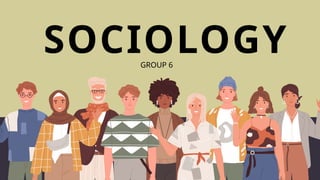
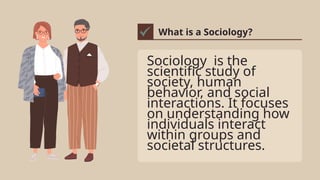
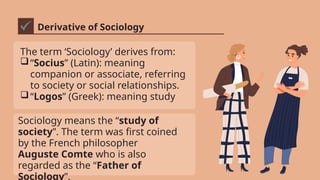
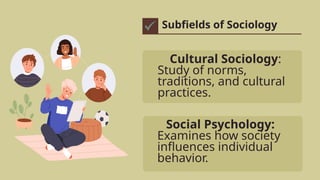

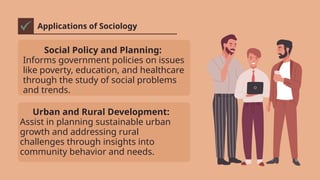
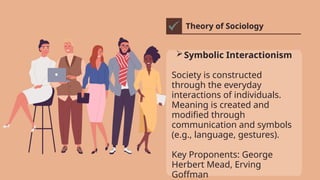
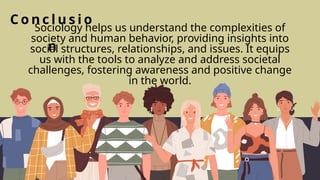

Ad
Recommended
Sociology unit 1
Sociology unit 1Partha Sarathi Mishra
╠²
Sociology is the scientific study of human society and social interactions. It employs the scientific method to analyze social behavior and seeks to understand the origins, organization, and development of human society. Sociology studies social, economic, political, and religious activities of people and the various aspects of communities, families, and how their behavior changes with social mobility. There is ongoing debate around the scope of sociology, with some arguing it should be a specific science and others believing it is a general science with a vast scope.Sociology by mehak.pptx
Sociology by mehak.pptxMehak Nabi
╠²
Sociology is the scientific study of human societies, social relationships, and social behaviors, emphasizing the interactions and organization of groups. Influential figures in sociology include Auguste Comte, Max Weber, and Emile Durkheim, who contributed foundational theories and definitions of the discipline. The nature of sociology is debated, with some viewing it as a science due to its use of scientific methods, while others see it as an art due to the complexities and subjectivity of studying human behavior.SOCIOLOGY OF EDUCATION
SOCIOLOGY OF EDUCATIONFidy Zegge
╠²
The document outlines the sociology of education, detailing learning outcomes, course content, assessments, and the influence of prominent sociologists such as Durkheim and Weber on educational systems, particularly in Tanzania. It emphasizes the importance of understanding the social aspects of education, the role of various stakeholders, and examines the relationship between education and societal values, socialization, and mobility. Additionally, it categorizes sociology into various branches and discusses the historical developments that have shaped the sociology of education as a distinct field of study. definitions of sociology
definitions of sociologyDr.Kamran Ishfaq
╠²
Sociology is defined in multiple ways by different scholars:
- Auguste Comte defined it as the scientific study of society.
- Max Weber defined it as the study of social action.
- Park and Burgess defined it as the study of collective behavior.
- Emile Durkheim defined it as the study of social facts through social institutions.
- Tonnies defined it as the study of humans living together.
- Simmel defined it as the study of social groups based on social interaction.
In conclusion, sociology can be defined as the science of society, human behavior, human interaction and relationships.The study of social behavior.pptx
The study of social behavior.pptxMaqbool Ahmad
╠²
Sociology is the study of society and human social behavior. Some of the key founders who helped establish sociology as a discipline include Auguste Comte, Karl Marx, Emile Durkheim, Max Weber, W.E.B. Du Bois and Harriet Martineau. Sociologists study topics such as social inequality, family structures, education, religion, and health from a macro and micro level perspective using various research methods including surveys, experiments, observation and secondary data analysis. The field aims to develop a sociological imagination to understand how social structures and individual experiences are interconnected.Lecture 1. definitions of sociology
Lecture 1. definitions of sociologyDr.Kamran Ishfaq
╠²
Sociology is defined by several scholars as: the scientific study of society (Auguste Comte); the study of social action (Max Weber); the study of collective behavior (Park & Burgess); and the study of social facts through social institutions (Emile Durkheim). It can be concluded that sociology is the science of society, human behavior, human interaction and relationships. Modern sociology began with Auguste Comte coining the term and considering it the "Social Physics." As a field of knowledge, sociology aims to build understanding of society and social interaction, while as a profession it involves teaching, research, and administration.SociologyReport
SociologyReportEmilyaa27
╠²
Sociology is the scientific study of human social behavior and society. It examines how people interact with each other and how they organize themselves into larger social groups. Some key aspects of sociology covered in the document include:
- Sociology studies social interactions, social organizations, social change, social structure, and social relationships.
- The origins and emergence of sociology are traced back to the Industrial Revolution and the works of early theorists like Comte, Marx, Durkheim, and Weber.
- There are different approaches to sociology including evolutionary, interactionist, functionalist, and conflict approaches.
- Culture refers to the learned behaviors, beliefs, attitudes, and norms that are shared by aSocio lec 1 updkkkkkkkkkkkkkkkkkated.pptx
Socio lec 1 updkkkkkkkkkkkkkkkkkated.pptxShafaatHussain20
╠²
The document outlines the foundational concepts and definitions of sociology, emphasizing its role as a distinct social science that studies human interactions and societal phenomena. It discusses the nature, scope, and importance of sociology, differentiating it from other social sciences, and highlights contributions from key figures like Auguste Comte, Karl Marx, and Emile Durkheim. Additionally, it explains the significance of the sociological perspective in understanding human behavior within social contexts.Introduction_to_Sociology powerpoint.pptx
Introduction_to_Sociology powerpoint.pptxEmmanuelTempla1
╠²
Sociology is the scientific study of society, human social behavior, and the organization of human social interaction. The document outlines the key founders of sociology in the 19th century and their contributions to establishing it as a science. It also summarizes major areas of focus in sociology such as macro and micro levels of analysis, key theoretical paradigms, and common research methods used by sociologists like surveys, experiments, and participant observation.Introduction_to_Sociology powerpoint.pptx
Introduction_to_Sociology powerpoint.pptxVeronicaSchuth
╠²
Sociology is the scientific study of society, human social behavior, and the organization of human social interaction. The document traces the origins of sociology from early philosophers through its establishment as a formal discipline in the 19th century by founders including Auguste Comte, Karl Marx, Emile Durkheim, and Max Weber. It outlines key areas of focus in sociology such as macro and micro levels of analysis, social structures and functions, and symbolic interaction. Research methods including experiments, surveys, participant observation, and secondary data analysis are also summarized.Introduction_to_Sociology powerpoint.pptx
Introduction_to_Sociology powerpoint.pptxDrMuthukumarTS
╠²
Sociology is the scientific study of society, human social behavior, and the organization of human social interaction. The document outlines the key founders of sociology in the 19th century and their contributions to establishing it as a science. It also summarizes major areas of focus in sociology such as macro and micro levels of analysis, key theoretical paradigms, and common research methods used by sociologists like surveys, experiments, and participant observation.Sociology-Chapter-1. sociology most important
Sociology-Chapter-1. sociology most importantlokendrabhandari0000
╠²
Sociology is defined as the academic and systematic study of society, focusing on social interactions, behaviors, and institutions. It emerged as a distinct discipline in the 19th century, influenced by various historical, cultural, and philosophical factors, including the works of early thinkers like Auguste Comte. The scope of sociology is broad, encompassing diverse social phenomena, and relies on various research methods for analyzing social structures and dynamics.Introduction to sociology ppt shameem ahamad
Introduction to sociology ppt shameem ahamadShameem Ganayee
╠²
The document provides an introduction to sociology, emphasizing its evolution and significance as the study of society and social interactions. It defines sociology through various perspectives, highlighting its role in understanding social behavior, relationships, and the impact of social structures on individuals. The text outlines sociology's broad scope, addressing its methodology, applications, and relevance in examining social issues and behaviors. Introduction to Sociology
Introduction to SociologyRajThakuri
╠²
This document provides an introduction and overview of sociology. It defines sociology as the systematic study of social behavior and human groups. Participation is expected in sociology courses, but certain distracted behaviors like sleeping or using phones are not considered participation. The document then discusses some key founders and aspects of sociology like its emergence as a field and common methods used.BCA Semester First Society and Technology Unit 1
BCA Semester First Society and Technology Unit 1vc77bca01
╠²
This is the first chapter's presentation for Society and Technology of BCAnotes 2.pptxfhgourehyirthoitu56u6jyuytrytr
notes 2.pptxfhgourehyirthoitu56u6jyuytrytrravinatwadia
╠²
Sociology studies society, focusing on social interactions, structures, change, and inequality among various facets like family, education, and crime. Key theorists such as Auguste Comte and ├ēmile Durkheim define sociology in terms of social phenomena and facts influencing behavior. This discipline overlaps with anthropology, particularly in social anthropology, as both explore cultural and organizational aspects of societies.Uscp-reportnxjdhsbznxjcjdndnxnj-new.pptx
Uscp-reportnxjdhsbznxjcjdndnxnj-new.pptxcabillonchamz5
╠²
Sociology systematically studies human behavior within the context of social groups and institutions, emphasizing social interactions and the influence of societal structures. It encompasses various schools of thought, focuses on social changes, inequalities, and problems, and establishes goals aimed at understanding and explaining social behavior. The discipline emerged in the 19th century, influenced by historical events and key thinkers, and utilizes three major theoretical perspectives: functionalism, conflict theory, and symbolic interactionism.Sociology.pptx
Sociology.pptxzineb916254
╠²
Sociology is the study of society and human social behavior. It emerged in the 19th century to understand the social changes resulting from the Industrial Revolution and other major societal transformations. Sociology analyzes social structures, institutions, organizations, and human interaction and development within social systems. It aims to discover the fundamental laws governing societal phenomena using empirical research and the formulation of theories.Introduction to Sociology
Introduction to SociologyKokoStevan
╠²
The document provides an introduction to the field of sociology. It defines sociology as the scientific study of society and social behavior. It explains that sociologists seek to understand how social structures, groups, categories and institutions shape human interactions and experiences. Some of the key founders who helped establish sociology as a discipline are mentioned, including Auguste Comte, Karl Marx, Emile Durkheim and Max Weber. The document also provides an overview of major areas of focus within sociology such as social inequality, family studies, education, work and religion. It discusses careers that sociology training can prepare students for and introduces concepts like sociological imagination and research methods.sociologyuniti-220325064255.pdf
sociologyuniti-220325064255.pdfShivamsharma15812
╠²
Sociology is the scientific study of human society and social interactions. It emerged in the 19th century due to factors like the industrial revolution and philosophical inquiry. Auguste Comte coined the term sociology and is considered the father of the discipline. Sociology studies societies and social phenomena like institutions, communities, and social groups. It has many branches that look at topics such as religion, the economy, urban and rural areas, politics, law, and more. Sociology uses both empirical observation and rational theories to understand social dynamics.Sociology Unit I.pptx
Sociology Unit I.pptxNagamani Manjunath
╠²
This document provides an introduction to the topic of sociology. It defines sociology as the scientific study of human societies, groups, and social interactions. It discusses the key founders and theories of sociology. It also outlines the nature and scope of sociology as a social science that studies societies and social phenomena using both empirical observation and rational analysis. The document aims to help students understand and appreciate the importance of sociology as a field of study.Lesson 1 introduction to sociology (prelim)
Lesson 1 introduction to sociology (prelim)Apol Maligdong
╠²
This document provides an overview of sociology. It defines sociology as the scientific study of human society and culture. Some key points:
- Auguste Comte coined the term "sociology" in the 19th century and defined it as the study of social dynamics and social statics.
- Major founding thinkers included Karl Marx, who studied social class and conflict, and Emile Durkheim, who defined sociology as the study of social facts.
- Sociology can be studied at the micro, macro, and meso levels and examines topics like social organization, social change, and social problems.
- Major theoretical perspectives are structural functionalism, social conflict theory, and symbolic interactionSociology_DVVDVDVDVDVDDVVDVSem_1_(2).pptx
Sociology_DVVDVDVDVDVDDVVDVSem_1_(2).pptxAkhileshPatro6
╠²
Sociology emerged in the 19th century from influences like the industrial revolution, growth of natural sciences, and social/political reforms. Auguste Comte coined the term "sociology" in 1839 to describe the scientific study of human society. Sociology studies social life, groups, institutions, relationships, and processes between individuals and groups. It aims to understand social behavior and how social factors influence people. The scope of sociology ranges from specific social forms to a general study of all aspects of social life, according to different schools of thought. Sociology is related to but distinct from other social sciences like anthropology, economics, and political science that also examine aspects of human social life and interactions.Sociology.pptxvsbbsabababhabqhabhwhwhwnja
Sociology.pptxvsbbsabababhabqhabhwhwhwnjabaranguru224
╠²
Sociology, coined by August Comte in 1839, is the scientific study of society, human behavior in groups, and social relationships. It is an independent social science that aims to understand social systems, interactions, and cultural influences while employing both rational and empirical methods. The study of sociology is crucial for enhancing societal understanding, addressing social issues, and fostering self-awareness in individuals.Sociology
SociologyStudent
╠²
Sociology is defined by many scholars as the systematic study of human social life, groups, societies, and social interactions. It examines individuals within social contexts and aims to understand social phenomena and human behavior. Sociology grew out of the industrial and scientific revolutions of the 18th and 19th centuries and seeks to understand social life scientifically. It is a broad field that is concerned with various aspects of human social behavior and has practical applications in social policy, research, and reform.Sociology Introduction (1).pptx
Sociology Introduction (1).pptxPoojaSen20
╠²
This document provides an introduction to sociology, defining it as the study of society and human interaction, with origins traced back to Auguste Comte in 1839. It discusses various definitions of sociology, highlighting its nature as an independent, positive, abstract, and empirical science that seeks to understand social behaviors and relationships without practical application. Furthermore, sociology is depicted as a general social science focused on broad patterns rather than individual cases.BCA-So.-Tech-Chapter-One society and technology.pptx
BCA-So.-Tech-Chapter-One society and technology.pptxd45510693
╠²
The document provides an overview of sociology, detailing its definition as the scientific study of social relationships and institutions, and discussing the influence of social structures on human behavior. It highlights the relationship between sociology and other social sciences, the various schools of thought regarding its scope, and the fundamental concepts of social interactions, processes, and problems. Ultimately, it emphasizes sociology's aim to understand individuals and societies through empirical research and fieldwork.MUSIC examination review for 2nd grading.pptx
MUSIC examination review for 2nd grading.pptxjosephcardeo2
╠²
The document discusses various concepts in music, art, games, and community health, explaining terms such as musical intervals, melody, and digital painting. It covers types of games, community characteristics, environmental issues, and the importance of waste segregation. Additionally, it emphasizes the significance of community health and offers guidance on addressing local environmental concerns.More Related Content
Similar to sociology the art of understanding the mind.pptx (20)
Introduction_to_Sociology powerpoint.pptx
Introduction_to_Sociology powerpoint.pptxEmmanuelTempla1
╠²
Sociology is the scientific study of society, human social behavior, and the organization of human social interaction. The document outlines the key founders of sociology in the 19th century and their contributions to establishing it as a science. It also summarizes major areas of focus in sociology such as macro and micro levels of analysis, key theoretical paradigms, and common research methods used by sociologists like surveys, experiments, and participant observation.Introduction_to_Sociology powerpoint.pptx
Introduction_to_Sociology powerpoint.pptxVeronicaSchuth
╠²
Sociology is the scientific study of society, human social behavior, and the organization of human social interaction. The document traces the origins of sociology from early philosophers through its establishment as a formal discipline in the 19th century by founders including Auguste Comte, Karl Marx, Emile Durkheim, and Max Weber. It outlines key areas of focus in sociology such as macro and micro levels of analysis, social structures and functions, and symbolic interaction. Research methods including experiments, surveys, participant observation, and secondary data analysis are also summarized.Introduction_to_Sociology powerpoint.pptx
Introduction_to_Sociology powerpoint.pptxDrMuthukumarTS
╠²
Sociology is the scientific study of society, human social behavior, and the organization of human social interaction. The document outlines the key founders of sociology in the 19th century and their contributions to establishing it as a science. It also summarizes major areas of focus in sociology such as macro and micro levels of analysis, key theoretical paradigms, and common research methods used by sociologists like surveys, experiments, and participant observation.Sociology-Chapter-1. sociology most important
Sociology-Chapter-1. sociology most importantlokendrabhandari0000
╠²
Sociology is defined as the academic and systematic study of society, focusing on social interactions, behaviors, and institutions. It emerged as a distinct discipline in the 19th century, influenced by various historical, cultural, and philosophical factors, including the works of early thinkers like Auguste Comte. The scope of sociology is broad, encompassing diverse social phenomena, and relies on various research methods for analyzing social structures and dynamics.Introduction to sociology ppt shameem ahamad
Introduction to sociology ppt shameem ahamadShameem Ganayee
╠²
The document provides an introduction to sociology, emphasizing its evolution and significance as the study of society and social interactions. It defines sociology through various perspectives, highlighting its role in understanding social behavior, relationships, and the impact of social structures on individuals. The text outlines sociology's broad scope, addressing its methodology, applications, and relevance in examining social issues and behaviors. Introduction to Sociology
Introduction to SociologyRajThakuri
╠²
This document provides an introduction and overview of sociology. It defines sociology as the systematic study of social behavior and human groups. Participation is expected in sociology courses, but certain distracted behaviors like sleeping or using phones are not considered participation. The document then discusses some key founders and aspects of sociology like its emergence as a field and common methods used.BCA Semester First Society and Technology Unit 1
BCA Semester First Society and Technology Unit 1vc77bca01
╠²
This is the first chapter's presentation for Society and Technology of BCAnotes 2.pptxfhgourehyirthoitu56u6jyuytrytr
notes 2.pptxfhgourehyirthoitu56u6jyuytrytrravinatwadia
╠²
Sociology studies society, focusing on social interactions, structures, change, and inequality among various facets like family, education, and crime. Key theorists such as Auguste Comte and ├ēmile Durkheim define sociology in terms of social phenomena and facts influencing behavior. This discipline overlaps with anthropology, particularly in social anthropology, as both explore cultural and organizational aspects of societies.Uscp-reportnxjdhsbznxjcjdndnxnj-new.pptx
Uscp-reportnxjdhsbznxjcjdndnxnj-new.pptxcabillonchamz5
╠²
Sociology systematically studies human behavior within the context of social groups and institutions, emphasizing social interactions and the influence of societal structures. It encompasses various schools of thought, focuses on social changes, inequalities, and problems, and establishes goals aimed at understanding and explaining social behavior. The discipline emerged in the 19th century, influenced by historical events and key thinkers, and utilizes three major theoretical perspectives: functionalism, conflict theory, and symbolic interactionism.Sociology.pptx
Sociology.pptxzineb916254
╠²
Sociology is the study of society and human social behavior. It emerged in the 19th century to understand the social changes resulting from the Industrial Revolution and other major societal transformations. Sociology analyzes social structures, institutions, organizations, and human interaction and development within social systems. It aims to discover the fundamental laws governing societal phenomena using empirical research and the formulation of theories.Introduction to Sociology
Introduction to SociologyKokoStevan
╠²
The document provides an introduction to the field of sociology. It defines sociology as the scientific study of society and social behavior. It explains that sociologists seek to understand how social structures, groups, categories and institutions shape human interactions and experiences. Some of the key founders who helped establish sociology as a discipline are mentioned, including Auguste Comte, Karl Marx, Emile Durkheim and Max Weber. The document also provides an overview of major areas of focus within sociology such as social inequality, family studies, education, work and religion. It discusses careers that sociology training can prepare students for and introduces concepts like sociological imagination and research methods.sociologyuniti-220325064255.pdf
sociologyuniti-220325064255.pdfShivamsharma15812
╠²
Sociology is the scientific study of human society and social interactions. It emerged in the 19th century due to factors like the industrial revolution and philosophical inquiry. Auguste Comte coined the term sociology and is considered the father of the discipline. Sociology studies societies and social phenomena like institutions, communities, and social groups. It has many branches that look at topics such as religion, the economy, urban and rural areas, politics, law, and more. Sociology uses both empirical observation and rational theories to understand social dynamics.Sociology Unit I.pptx
Sociology Unit I.pptxNagamani Manjunath
╠²
This document provides an introduction to the topic of sociology. It defines sociology as the scientific study of human societies, groups, and social interactions. It discusses the key founders and theories of sociology. It also outlines the nature and scope of sociology as a social science that studies societies and social phenomena using both empirical observation and rational analysis. The document aims to help students understand and appreciate the importance of sociology as a field of study.Lesson 1 introduction to sociology (prelim)
Lesson 1 introduction to sociology (prelim)Apol Maligdong
╠²
This document provides an overview of sociology. It defines sociology as the scientific study of human society and culture. Some key points:
- Auguste Comte coined the term "sociology" in the 19th century and defined it as the study of social dynamics and social statics.
- Major founding thinkers included Karl Marx, who studied social class and conflict, and Emile Durkheim, who defined sociology as the study of social facts.
- Sociology can be studied at the micro, macro, and meso levels and examines topics like social organization, social change, and social problems.
- Major theoretical perspectives are structural functionalism, social conflict theory, and symbolic interactionSociology_DVVDVDVDVDVDDVVDVSem_1_(2).pptx
Sociology_DVVDVDVDVDVDDVVDVSem_1_(2).pptxAkhileshPatro6
╠²
Sociology emerged in the 19th century from influences like the industrial revolution, growth of natural sciences, and social/political reforms. Auguste Comte coined the term "sociology" in 1839 to describe the scientific study of human society. Sociology studies social life, groups, institutions, relationships, and processes between individuals and groups. It aims to understand social behavior and how social factors influence people. The scope of sociology ranges from specific social forms to a general study of all aspects of social life, according to different schools of thought. Sociology is related to but distinct from other social sciences like anthropology, economics, and political science that also examine aspects of human social life and interactions.Sociology.pptxvsbbsabababhabqhabhwhwhwnja
Sociology.pptxvsbbsabababhabqhabhwhwhwnjabaranguru224
╠²
Sociology, coined by August Comte in 1839, is the scientific study of society, human behavior in groups, and social relationships. It is an independent social science that aims to understand social systems, interactions, and cultural influences while employing both rational and empirical methods. The study of sociology is crucial for enhancing societal understanding, addressing social issues, and fostering self-awareness in individuals.Sociology
SociologyStudent
╠²
Sociology is defined by many scholars as the systematic study of human social life, groups, societies, and social interactions. It examines individuals within social contexts and aims to understand social phenomena and human behavior. Sociology grew out of the industrial and scientific revolutions of the 18th and 19th centuries and seeks to understand social life scientifically. It is a broad field that is concerned with various aspects of human social behavior and has practical applications in social policy, research, and reform.Sociology Introduction (1).pptx
Sociology Introduction (1).pptxPoojaSen20
╠²
This document provides an introduction to sociology, defining it as the study of society and human interaction, with origins traced back to Auguste Comte in 1839. It discusses various definitions of sociology, highlighting its nature as an independent, positive, abstract, and empirical science that seeks to understand social behaviors and relationships without practical application. Furthermore, sociology is depicted as a general social science focused on broad patterns rather than individual cases.BCA-So.-Tech-Chapter-One society and technology.pptx
BCA-So.-Tech-Chapter-One society and technology.pptxd45510693
╠²
The document provides an overview of sociology, detailing its definition as the scientific study of social relationships and institutions, and discussing the influence of social structures on human behavior. It highlights the relationship between sociology and other social sciences, the various schools of thought regarding its scope, and the fundamental concepts of social interactions, processes, and problems. Ultimately, it emphasizes sociology's aim to understand individuals and societies through empirical research and fieldwork.More from josephcardeo2 (6)
MUSIC examination review for 2nd grading.pptx
MUSIC examination review for 2nd grading.pptxjosephcardeo2
╠²
The document discusses various concepts in music, art, games, and community health, explaining terms such as musical intervals, melody, and digital painting. It covers types of games, community characteristics, environmental issues, and the importance of waste segregation. Additionally, it emphasizes the significance of community health and offers guidance on addressing local environmental concerns.aral pan examination review for 2nd grading.pptx
aral pan examination review for 2nd grading.pptxjosephcardeo2
╠²
Sa loob ng apatnapung taon ng pananakop ng mga Amerikano sa Pilipinas, maraming kaganapan at pagbabago ang nangyari na nagbukas ng mga oportunidad at panghamon sa mga Pilipino. Kasama sa mga mahalagang pangyayari ang pagbuo ng mga batas tulad ng Philippine Autonomy Act at Public Defender Act, pati na rin ang pagkakaroon ng malawak na kaalaman at kasanayan mula sa sistemang pang-edukasyon ng mga Amerikano. Ang mga Pilipino ay nakipaglaban din sa mga Hapon noong Ikalawang Digmaang Pandaigdig at ang pagbuo ng Puppet Republic na nagpamalas ng hirap ng kanilang sitwasyon sa ilalim ng banyagang dominasyon.2-CHARACTERISTICS sepaktakr reference.pptx
2-CHARACTERISTICS sepaktakr reference.pptxjosephcardeo2
╠²
The document outlines the essential characteristics, duties, and paraphernalia required for referees in sports. Key traits of a good official include integrity, hustle, judgment, communication, consistency, courage, and common sense. The duties cover various roles, including tournament managers and different types of referees, emphasizing the importance of adhering to ethical standards and being prepared with necessary equipment for officiating.4-QUALIFICATIONS spaktakraw presentation.pptx
4-QUALIFICATIONS spaktakraw presentation.pptxjosephcardeo2
╠²
The document outlines the qualifications required for officiating sepaktakraw, including knowledge of the game's rules, completion of a specialized training program, and certification from a recognized governing body. It highlights the importance of physical fitness, effective communication, adaptability, judgment, ethical conduct, and ongoing education in officiating. Experience at various competition levels is also emphasized as valuable for applying theoretical knowledge practically.3-KEY-QUALITIES sepaktakraw basic skills.pptx
3-KEY-QUALITIES sepaktakraw basic skills.pptxjosephcardeo2
╠²
Good officiating officials in sepaktakraw need several key qualities, including knowledge of the rules, fairness, consistency, and effective communication skills. They must also demonstrate quick decision-making, physical fitness, integrity, adaptability, calmness under pressure, and a commitment to continuous learning. These attributes are essential for maintaining the integrity and flow of the game.Ad
Recently uploaded (20)
University of Ghana Cracks Down on Misconduct: Over 100 Students Sanctioned
University of Ghana Cracks Down on Misconduct: Over 100 Students SanctionedKweku Zurek
╠²
University of Ghana Cracks Down on Misconduct: Over 100 Students Sanctioned
2025 June Year 9 Presentation: Subject selection.pptx
2025 June Year 9 Presentation: Subject selection.pptxmansk2
╠²
2025 June Year 9 Presentation: Subject selectionCommunicable Diseases and National Health Programs ŌĆō Unit 9 | B.Sc Nursing 5t...
Communicable Diseases and National Health Programs ŌĆō Unit 9 | B.Sc Nursing 5t...RAKESH SAJJAN
╠²
This PowerPoint presentation covers Unit 9 ŌĆō Communicable Diseases and National Health Programs, a core part of the 5th Semester B.Sc Nursing (Community Health Nursing ŌĆō I) syllabus, as outlined by the Indian Nursing Council (INC).
This unit enables nursing students to understand the epidemiology, prevention, control, and nursing management of common communicable diseases in India, while also offering a structured overview of the National Health Programs implemented to address them.
The content is critical for effective field practice, disease surveillance, early detection, referral, and health education, equipping students to participate in public health interventions and outbreak control at community and national levels.
¤ōś Key Topics Covered in the PPT:
Definition and classification of communicable diseases
Modes of transmission and chain of infection
Common communicable diseases in India:
Malaria
Tuberculosis
Leprosy
Dengue
HIV/AIDS
Hepatitis
COVID-19 (if included in the current curriculum)
Diarrheal diseases
Acute Respiratory Infections (ARIs)
Epidemiological factors, causative agents, symptoms, and incubation periods
Prevention and control strategies: primary, secondary, and tertiary levels
Nursing responsibilities in patient care, contact tracing, community surveillance, and outbreak control
Health education and behavior change communication for community awareness
Vaccination schedules and cold chain maintenance
National Health Programs related to communicable diseases:
National Vector Borne Disease Control Program (NVBDCP)
Revised National Tuberculosis Control Program (RNTCP)
National Leprosy Eradication Program (NLEP)
National AIDS Control Program (NACP)
Universal Immunization Program (UIP)
IDSP ŌĆō Integrated Disease Surveillance Program
Overview of standard treatment protocols, referral mechanisms, and community nurseŌĆÖs role in program implementation
This presentation is ideal for:
Nursing students preparing for university exams, class tests, and field projects
Tutors teaching infectious disease nursing and public health interventions
Nurses involved in immunization, outbreak investigation, and contact tracing
It provides a student-friendly breakdown of concepts, aligned with national priorities, including flowcharts, tables, case examples, and simplified text for field-level application.Paper 107 | From Watchdog to Lapdog: IshiguroŌĆÖs Fiction and the Rise of ŌĆ£Godi...
Paper 107 | From Watchdog to Lapdog: IshiguroŌĆÖs Fiction and the Rise of ŌĆ£Godi...Rajdeep Bavaliya
╠²
Dive into a captivating analysis where Kazuo IshiguroŌĆÖs nuanced fiction meets the stark realities of postŌĆæ2014 Indian journalism. Uncover how ŌĆ£Godi MediaŌĆØ turned from watchdog to lapdog, echoing the moral compromises of IshiguroŌĆÖs protagonists. WeŌĆÖll draw parallels between restrained narrative silences and sensationalist headlinesŌĆöare our media heroes or traitors? DonŌĆÖt forget to follow for more deep dives!
M.A. Sem - 2 | Presentation
Presentation Season - 2
Paper - 107: The Twentieth Century Literature: From World War II to the End of the Century
Submitted Date: April 4, 2025
Paper Name: The Twentieth Century Literature: From World War II to the End of the Century
Topic: From Watchdog to Lapdog: IshiguroŌĆÖs Fiction and the Rise of ŌĆ£Godi MediaŌĆØ in Post-2014 Indian Journalism
[Please copy the link and paste it into any web browser to access the content.]
Video Link: https://youtu.be/kIEqwzhHJ54
For a more in-depth discussion of this presentation, please visit the full blog post at the following link: https://rajdeepbavaliya2.blogspot.com/2025/04/from-watchdog-to-lapdog-ishiguro-s-fiction-and-the-rise-of-godi-media-in-post-2014-indian-journalism.html
Please visit this blog to explore additional presentations from this season:
Hashtags:
#GodiMedia #Ishiguro #MediaEthics #WatchdogVsLapdog #IndianJournalism #PressFreedom #LiteraryCritique #AnArtistOfTheFloatingWorld #MediaCapture #KazuoIshiguro
Keyword Tags:
Godi Media, Ishiguro fiction, post-2014 Indian journalism, media capture, Kazuo Ishiguro analysis, watchdog to lapdog, press freedom India, media ethics, literature and media, An Artist of the Floating WorldNon-Communicable Diseases and National Health Programs ŌĆō Unit 10 | B.Sc Nursi...
Non-Communicable Diseases and National Health Programs ŌĆō Unit 10 | B.Sc Nursi...RAKESH SAJJAN
╠²
This PowerPoint presentation is prepared for Unit 10 ŌĆō Non-Communicable Diseases and National Health Programs, as per the 5th Semester B.Sc Nursing syllabus outlined by the Indian Nursing Council (INC) under the subject Community Health Nursing ŌĆō I.
This unit focuses on equipping students with knowledge of the causes, prevention, and control of non-communicable diseases (NCDs), which are a major public health challenge in India. The presentation emphasizes the nurseŌĆÖs role in early detection, screening, management, and referral services under national-level programs.
¤ö╣ Key Topics Included:
Definition, burden, and impact of NCDs in India
Epidemiology, risk factors, signs/symptoms, prevention, and management of:
Diabetes Mellitus
Hypertension
Cardiovascular Diseases
Stroke & Obesity
Thyroid Disorders
Blindness
Deafness
Injuries and Accidents (incl. road traffic injuries and trauma guidelines)
NCD-2 Cancers:
Breast Cancer
Cervical Cancer
Oral Cancer
Risk factors, screening, diagnosis, early signs, referral & palliative care
Role of nurse in screening, referral, counseling, and continuum of care
National Programs:
National Program for Prevention and Control of Cancer, Diabetes, Cardiovascular Diseases and Stroke (NPCDCS)
National Program for Control of Blindness
National Program for Prevention and Control of Deafness
National Tobacco Control Program (NTCP)
Introduction to Universal Health Coverage and Ayushman Bharat
Use of standard treatment protocols and referral flowcharts
This presentation is ideal for:
Classroom lectures, field assignments, health education planning, and student projects
Preparing for university exams, class tests, and community field postingsPaper 108 | ThoreauŌĆÖs Influence on Gandhi: The Evolution of Civil Disobedience
Paper 108 | ThoreauŌĆÖs Influence on Gandhi: The Evolution of Civil DisobedienceRajdeep Bavaliya
╠²
Dive into the powerful journey from ThoreauŌĆÖs 19thŌĆæcentury essay to GandhiŌĆÖs mass movement, and discover how one manŌĆÖs moral stand became the backbone of nonviolent resistance worldwide. Learn how conscience met strategy to spark revolutions, and why their legacy still inspires todayŌĆÖs social justice warriors. Uncover the evolution of civil disobedience. DonŌĆÖt forget to like, share, and follow for more deep dives into the ideas that changed the world.
M.A. Sem - 2 | Presentation
Presentation Season - 2
Paper - 108: The American Literature
Submitted Date: April 2, 2025
Paper Name: The American Literature
Topic: ThoreauŌĆÖs Influence on Gandhi: The Evolution of Civil Disobedience
[Please copy the link and paste it into any web browser to access the content.]
Video Link: https://youtu.be/HXeq6utg7iQ
For a more in-depth discussion of this presentation, please visit the full blog post at the following link: https://rajdeepbavaliya2.blogspot.com/2025/04/thoreau-s-influence-on-gandhi-the-evolution-of-civil-disobedience.html
Please visit this blog to explore additional presentations from this season:
Hashtags:
#CivilDisobedience #ThoreauToGandhi #NonviolentResistance #Satyagraha #Transcendentalism #SocialJustice #HistoryUncovered #GandhiLegacy #ThoreauInfluence #PeacefulProtest
Keyword Tags:
civil disobedience, Thoreau, Gandhi, Satyagraha, nonviolent protest, transcendentalism, moral resistance, Gandhi Thoreau connection, social change, political philosophyECONOMICS, DISASTER MANAGEMENT, ROAD SAFETY - STUDY MATERIAL [10TH]
ECONOMICS, DISASTER MANAGEMENT, ROAD SAFETY - STUDY MATERIAL [10TH]SHERAZ AHMAD LONE
╠²
This study material for Class 10th covers the core subjects of Economics, Disaster Management, and Road Safety Education, developed strictly in line with the JKBOSE textbook. It presents the content in a simplified, structured, and student-friendly format, ensuring clarity in concepts. The material includes reframed explanations, flowcharts, infographics, and key point summaries to support better understanding and retention. Designed for classroom teaching and exam preparation, it aims to enhance comprehension, critical thinking, and practical awareness among students.ROLE PLAY: FIRST AID -CPR & RECOVERY POSITION.pptx
ROLE PLAY: FIRST AID -CPR & RECOVERY POSITION.pptxBelicia R.S
╠²
Role play : First Aid- CPR, Recovery position and Hand hygiene.
Scene 1: Three friends are shopping in a mall
Scene 2: One of the friend becomes victim to electric shock.
Scene 3: Arrival of a first aider
Steps:
Safety First
Evaluate the victimŌĆśs condition
Call for help
Perform CPR- Secure an open airway, Chest compression, Recuse breaths.
Put the victim in Recovery position if unconscious and breathing normally.
Plate Tectonic Boundaries and Continental Drift Theory
Plate Tectonic Boundaries and Continental Drift TheoryMarie
╠²
This 28 slide presentation covers the basics of plate tectonics and continental drift theory. It is an effective introduction into a full plate tectonics unit study, but does not cover faults, stress, seismic waves, or seafloor spreading.
To download PDF, visit The Homeschool Daily. We will be uploading more slideshows to follow this one. Blessings, Marie Paper 109 | Archetypal Journeys in ŌĆśInterstellarŌĆÖ: Exploring Universal Themes...
Paper 109 | Archetypal Journeys in ŌĆśInterstellarŌĆÖ: Exploring Universal Themes...Rajdeep Bavaliya
╠²
Get ready to embark on a cosmic quest as we unpack the archetypal power behind Christopher NolanŌĆÖs ŌĆśInterstellar.ŌĆÖ Discover how heroŌĆÖs journey tropes, mythic symbols like wormholes and tesseracts, and themes of love, sacrifice, and environmental urgency shape this epic odyssey. Whether youŌĆÖre a film theory buff or a casual viewer, youŌĆÖll learn why CooperŌĆÖs journey resonates with timeless mythsŌĆöand what it means for our own future. Smash that like button, and follow for more deep dives into cinemaŌĆÖs greatest stories!
M.A. Sem - 2 | Presentation
Presentation Season - 2
Paper - 109: Literary Theory & Criticism and Indian Aesthetics
Submitted Date: April 5, 2025
Paper Name: Literary Theory & Criticism and Indian Aesthetics
Topic: Archetypal Journeys in ŌĆśInterstellarŌĆÖ: Exploring Universal Themes in NolanŌĆÖs Cosmic Odyssey
[Please copy the link and paste it into any web browser to access the content.]
Video Link: https://youtu.be/vHLaLZPHumk
For a more in-depth discussion of this presentation, please visit the full blog post at the following link: https://rajdeepbavaliya2.blogspot.com/2025/04/archetypal-journeys-in-interstellar-exploring-universal-themes-in-nolan-s-cosmic-odyssey.html
Please visit this blog to explore additional presentations from this season:
Hashtags:
#ChristopherNolan #Interstellar #NolanFilms #HeroJourney #CosmicOdyssey #FilmTheory #ArchetypalCriticism #SciFiCinema #TimeDilation #EnvironmentalCinema #MythicStorytelling
Keyword Tags:
Interstellar analysis, Christopher Nolan archetypes, heroŌĆÖs journey explained, wormhole symbolism, tesseract meaning, myth in sci-fi, cinematic archetypes, environmental themes film, love across time, Nolan film breakdownHealth Care Planning and Organization of Health Care at Various Levels ŌĆō Unit...
Health Care Planning and Organization of Health Care at Various Levels ŌĆō Unit...RAKESH SAJJAN
╠²
This comprehensive PowerPoint presentation is prepared for B.Sc Nursing 5th Semester students and covers Unit 2 of Community Health Nursing ŌĆō I based on the Indian Nursing Council (INC) syllabus. The unit focuses on the planning, structure, and functioning of health care services at various levels in India. It is especially useful for nursing educators and students preparing for university exams, internal assessments, or professional teaching assignments.
The content of this presentation includes:
Historical development of health planning in India
Detailed study of various health committees: Bhore, Mudaliar, Kartar Singh, Shrivastava Committee, etc.
Overview of major health commissions
In-depth understanding of Five-Year Plans and their impact on health care
Community participation and stakeholder involvement in health care planning
Structure of health care delivery system at central, state, district, and peripheral levels
Concepts and implementation of Primary Health Care (PHC) and Sustainable Development Goals (SDGs)
Introduction to Comprehensive Primary Health Care (CPHC) and Health and Wellness Centers (HWCs)
Expanded role of Mid-Level Health Providers (MLHPs) and Community Health Providers (CHPs)
Explanation of national health policies: NHP 1983, 2002, and 2017
Key national missions and schemes including:
National Health Mission (NHM)
National Rural Health Mission (NRHM)
National Urban Health Mission (NUHM)
Ayushman Bharat ŌĆō Pradhan Mantri Jan Arogya Yojana (PM-JAY)
Universal Health Coverage (UHC) and IndiaŌĆÖs commitment to equitable health care
This presentation is ideal for:
Nursing students (B.Sc, GNM, Post Basic)
Nursing tutors and faculty
Health educators
Competitive exam aspirants in nursing and public health
It is organized in a clear, point-wise format with relevant terminologies and a focus on applied knowledge. The slides can also be used for community health demonstrations, teaching sessions, and revision guides.Wax Moon, Richmond, VA. Terrence McPherson
Wax Moon, Richmond, VA. Terrence McPhersonTerrenceMcPherson1
╠²
Wax Moon is an independent record store keeping its foundational foothold in vinyl records by taking in collections and keeping the old 80s aesthetics alive with involvement in its community and participation with record distributors.PEST OF WHEAT SORGHUM BAJRA and MINOR MILLETS.pptx
PEST OF WHEAT SORGHUM BAJRA and MINOR MILLETS.pptxArshad Shaikh
╠²
Wheat, sorghum, and bajra (pearl millet) are susceptible to various pests that can significantly impact crop yields. Common pests include aphids, stem borers, shoot flies, and armyworms. Aphids feed on plant sap, weakening the plants, while stem borers and shoot flies damage the stems and shoots, leading to dead hearts and reduced growth. Armyworms, on the other hand, are voracious feeders that can cause extensive defoliation and grain damage. Effective management strategies, including resistant varieties, cultural practices, and targeted pesticide applications, are essential to mitigate pest damage and ensure healthy crop production.ABCs of Bookkeeping for Nonprofits TechSoup.pdf
ABCs of Bookkeeping for Nonprofits TechSoup.pdfTechSoup
╠²
Accounting can be hard enough if you havenŌĆÖt studied it in school. Nonprofit accounting is actually very different and more challenging still.
Need help? Join Nonprofit CPA and QuickBooks expert Gregg Bossen in this first-time webinar and learn the ABCs of keeping books for a nonprofit organization.
Key takeaways
* What accounting is and how it works
* How to read a financial statement
* What financial statements should be given to the board each month
* What three things nonprofits are required to track
What features to use in QuickBooks to track programs and grantsRevista digital preescolar en transformaci├│n
Revista digital preescolar en transformaci├│nguerragallardo26
╠²
EVOLUCI├ōN DEL CONTENIDO DE LA EVALUACI├ōN DE LOS RECURSOS Y DE LA FORMACI├ōN DE LOS DOCENTESHow to Manage Different Customer Addresses in Odoo 18 Accounting
How to Manage Different Customer Addresses in Odoo 18 AccountingCeline George
╠²
A business often have customers with multiple locations such as office, warehouse, home addresses and this feature allows us to associate with different addresses with each customer streamlining the process of creating sales order invoices and delivery orders.Paper 107 | From Watchdog to Lapdog: IshiguroŌĆÖs Fiction and the Rise of ŌĆ£Godi...
Paper 107 | From Watchdog to Lapdog: IshiguroŌĆÖs Fiction and the Rise of ŌĆ£Godi...Rajdeep Bavaliya
╠²
Paper 109 | Archetypal Journeys in ŌĆśInterstellarŌĆÖ: Exploring Universal Themes...
Paper 109 | Archetypal Journeys in ŌĆśInterstellarŌĆÖ: Exploring Universal Themes...Rajdeep Bavaliya
╠²
Ad
sociology the art of understanding the mind.pptx
- 2. Sociology is the scientific study of society, human behavior, and social interactions. It focuses on understanding how individuals interact within groups and societal structures. What is a Sociology?
- 3. Derivative of Sociology The term ŌĆśSociologyŌĆÖ derives from: ’ü▒ŌĆ£SociusŌĆØ (Latin): meaning companion or associate, referring to society or social relationships. ’ü▒ŌĆ£LogosŌĆØ (Greek): meaning study Sociology means the ŌĆ£study of societyŌĆØ. The term was first coined by the French philosopher Auguste Comte who is also regarded as the ŌĆ£Father of SociologyŌĆØ.
- 4. Subfields of Sociology Cultural Sociology: Study of norms, traditions, and cultural practices. Social Psychology: Examines how society influences individual behavior.
- 5. Subfields of Sociology Economic Sociology: Focuses on economic behaviors and systems. Political Sociology: Studies power, governance, and political interactions.
- 6. Applications of Sociology Social Policy and Planning: Informs government policies on issues like poverty, education, and healthcare through the study of social problems and trends. Urban and Rural Development: Assist in planning sustainable urban growth and addressing rural challenges through insights into community behavior and needs.
- 7. Theory of Sociology ’āśSymbolic Interactionism Society is constructed through the everyday interactions of individuals. Meaning is created and modified through communication and symbols (e.g., language, gestures). Key Proponents: George Herbert Mead, Erving Goffman
- 8. C o n c l u s i o n Sociology helps us understand the complexities of society and human behavior, providing insights into social structures, relationships, and issues. It equips us with the tools to analyze and address societal challenges, fostering awareness and positive change in the world.
- 9. Thank you for listening! ’üŖ